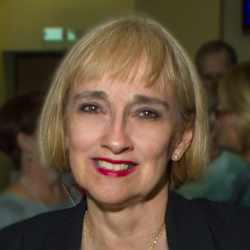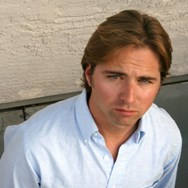By Sandi Page, LLS Student, Volunteer, and Member of the LLS Jupiter Marketing Committee
Our spotlight this week is on Dr. Taylor Hagood, Associate Professor of American Literature at Florida Atlantic University. In the interest of full disclosure, Dr. Hagood is my favorite professor at FAU/LLS so I was particularly delighted to be asked to interview him.
- Why did you choose to become an English professor? Did you ever consider a completely different career path?
I have been involved in the arts and humanities throughout my life. As an undergraduate, I seriously considered majoring in philosophy or history instead of English, but the study of literature consistently won me because it contained these other subjects. Since I love to write and read more than anything else, it made sense to pursue a career as an English professor and scholar. I should add, too, that I enjoy the performative aspect of teaching. All of that said, I have always been very interested in art and music, and considered pursuing careers in those directions.
- You have the gift, during your lectures, of putting yourself so completely into the time period, life, environment and mindset of your subject that you appear to be speaking to your audience as a member of your subject’s close entourage…..and you speak about them for an hour and a half without notes. How do you prepare yourself for giving such a lecture?
This is really a great question. I do not know exactly how other lecturers do things, but for me, the preparation for LLS lectures is intense. Obviously, it is important to know the subject as well as possible. I always read and/or reread everything I can. The reading and knowing is just the starting point though. Equally important is deciding how to present the material in a way that not only gets the point across but hopefully resonates on larger levels. The narrative and the emotions and significance of the subject are crucial, since anyone can go and read the facts on the subject. My goal is to try and create an experience that will be interesting and informative and make people both think and feel. I spend a great deal of time trying to think about what the world looked like to the writers I discuss, how readers of their works interfaced with their moment, and so on. It is very important to find the correct proportions for the points I want to make. At the same time, it is important to include some space in the presentation for spontaneity because my experience with LLS has been that any number of things will probably happen during that hour and a half that I cannot anticipate in any way. For example, while I try to anticipate questions, there are always one or two I do not expect. More than in any other setting I have ever been in, LLS requires complete focus and sharpness, and if it is not there, everything runs a great risk of falling flat.
- How young were you when you discovered your love of books? What was your favorite book as a child? As an adult?
My father taught me to read when I was very young, probably three or four years old. He decided to build my vocabulary, also; I especially remember learning the word “metamorphosis.” I read the kinds of books most elementary school children read but also was interested in others beyond what most of my peers were reading. I tackled Dickens’s David Copperfield in second grade. It is difficult to pick one book as a favorite either now or at any time of my life. As a child, I was probably most influenced by Mark Twain’s Huckleberry Finn. One of my very favorite books as an adult is Mikhail Bulgakov’s The Master and Margarita. On any given day, my list of favorites would also include Faulkner’s Absalom, Absalom!, Hemingway’s The Sun Also Rises, Bram Stoker’s Dracula, Charlotte Bronte’s Jane Eyre, the stories of Flannery O’Connor, Eudora Welty’s The Robber Bridegroom, Shakespeare’s King Henry IV, part 1, and the poetry of John Keats and James Wright. I also happen to enjoy the mystery novels of Donna Leon, and lately I have been reading the memoirs of Giacomo Casanova.
- You are currently giving an 8-week series of lectures at FAU/LLS Jupiter on “The Harlem Renaissance” and you wrote a book titled Secrecy, Magic, and the One-Act Plays of Harlem Renaissance Women Writers. What sparked your interest in the Harlem Renaissance?
I first got interested in the movement through its music—Bessie Smith, Billie Holiday, Louis Armstrong, Duke Ellington, and others. As a teenager, an English teacher read to my class Langston Hughes’s poem “The Weary Blues,” which embodied that music. Then I read Zora Neale Hurston’s Their Eyes Were Watching God and thought it one of the most beautiful novels ever. When I encountered the one-act plays of women writers as a graduate student, I was hooked. I then began to read issues of Crisis and Opportunity magazines, which were major outlets of the moment, and deepened my reading of fiction and poetry.
- You and I have spoken together in French so I know you speak at least one foreign language. Are there any other foreign languages that you can converse in?
I love languages very much. I am somewhat fluent in German (some days better than others), and I can converse in Italian on a limited basis. I know a little Spanish. I know a smattering of Czech, Ukrainian, and Hungarian but would not want to have to talk my way out of a tense situation in any of those languages. If I had all the time in the world, I would probably try to learn as many languages as possible, starting, probably, with Icelandic, since I love Icelandic sagas and would love to be able to read them in the original.
- You are often invited to lecture abroad. How do foreign students respond to your Southern accent?
Well, my accent is a pretty complicated mix, and it seems to throw most people of any place I encounter for the first time. Most of my students who are not native English speakers tell me they have difficulty understanding me at first.
- What five famous people would you invite to a dinner party? What would you serve?
This is quite a question. If you mean five famous people of our own moment, then I guess Sophia Loren, Peyton Manning, Diane Lane, Robert Duvall, and Queen Elizabeth I. If you mean famous people of all time, then probably Rita Hayworth would be at the top of my list, followed by Claudia Cardinale, Cary Grant, Shaka Zulu, and Jimmie Rodgers. I would consider inviting Marcel Proust, but I suspect he would be too morose. As for what to serve, probably my mother’s fried turkey (and tofurkey for the vegetarians).
- A few years back, you delighted and stunned both staff and students alike with your piano and singing skills during your glorious one-time event performance of the life and work of Jimmie Rodgers, an early blues/country/pop singer from Meridian, Mississippi. The whole evening represents one of my best memories at LLS. Can we ever look forward to such a treat again?
My reason for playing then was to try and make Rodgers’s music as immediate as possible. I’m not sure if I’ll do such a thing again.
- How would you finish this sentence? What most people don’t know about me is
that I harbor an ambition to raise goats and make and market goat cheese.
- You have also written three books about William Faulkner: Faulkner’s Imperialism: Space, Place and the Materiality of Myth (2008), Faulkner, Writer of Disability (2014) and Critical Insights, The Sound and the Fury (2014). How do you explain many readers’ complaints that his books are difficult, even tedious, to read? When Faulkner was the first writer-in-residence at the University of Virginia in the late 1950s, he was known as a notorious drinker in Charlottesville, and such stories had followed him throughout his career. What effect do you think that alcohol had on his writing?
Faulkner is indeed very difficult, as are many other Modernist writers. The reader must approach his work on the writer’s terms. I’m not sure this reader-writer situation has ever been one congenial to most readers, but I suspect it is less so now than ever in a moment when media is generally keyed to niches and to pleasing the reader’s desires. It is not my understanding that Faulkner ever wrote while intoxicated, although he was known to go on binges when he would finish a novel.
- In researching for this interview, I checked the website “Rate My Professors” for undergraduate students at FAU. You received high grades for your great intellect, your course content and your helpfulness to students. You were ALSO rated “Red Hot Chili Pepper” in the “Hotness” department? Care to comment????!!
Ha ha, well, if someone felt strongly enough to go onto the website and write something positive about me, I appreciate that very much.
- What has surprised you most about the students you teach at FAU Lifelong Learning?
I love to hear about the experiences of the patrons of LLS—the people they’ve known, the places they have been, their careers. There have been many interesting surprises along the way.
Dr. Hagood is currently presenting a series of lectures on “The Harlem Renaissance” at LLS Jupiter (Mondays, 1:30-3:00 p.m., January 11, 25, February 1, 8, 15, 22, 29, March 7). A book signing event will follow his lecture on Monday, January 25, 2016. His latest books Undead Souths (2015) and Faulkner, Writer of Disability (2014) will be available for purchase.
Taylor Hagood, Ph.D., is the 2013-2014 Lifelong Learning Society Distinguished Professor of Arts and Letters and Associate Professor of American Literature at FAU. Receiving his Ph.D. in United States Literature and Culture from the University of Mississippi, where he was the Frances Bell McCool Fellow in Faulkner Studies, Professor Hagood has authored five books (see interview for titles). In 2009-2010, he was a Fulbright Professor in the Amerika Institut at Ludwig-Maximilians-Universität in Munich, Germany, and he was awarded the 2010-2011 Scholar of the Year Award at the Assistant Professor level.









Taylor Hagood is my favorite professor, too! He makes his subjects so interesting and (I must confess) his is the only class in which I have not nodded off. His knowledge and talents truly amaze me. I feel so fortunate to be able to attend his lectures.
.
Great interview! As a new student to Dr. Hagood’s classes, I appreciate the insight to this fascinating professor.
Dr. Taylor Hagood reminds me of the American artist and illustrator Edward Gorey.
We think Dr. Hagood rocks, even after attending just one lecture!